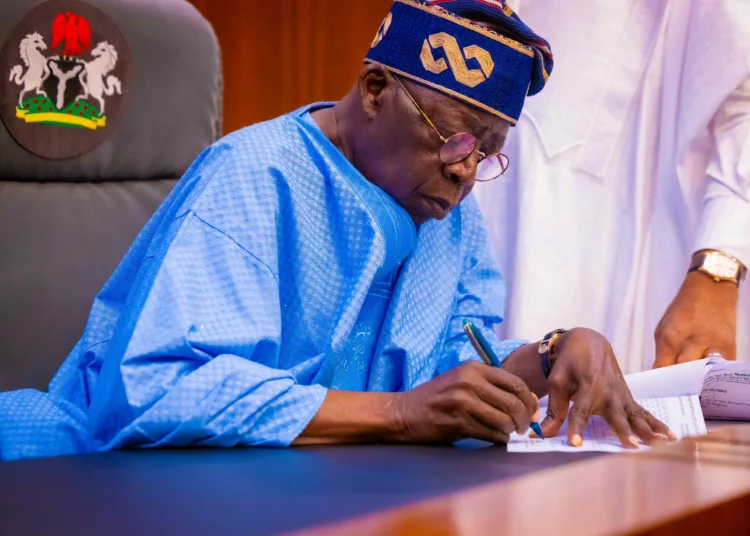Recently, the President Bola Tinubu administration won some plaudits from its supporters and critics alike for some of its policy pronouncements and actions.
One of such actions was a revival of the fight against corruption which has seen the anti-graft agencies go after prominent government figures, including a serving minister and ex-minister, as well as top businessmen who hitherto seemed untouchable.
Another of such popular policy moves was the significant cut in the official travel delegation of top government officials, starting from the president and vice president and cascading down to their wives and chief executives of government ministries, agencies and departments (MDAs).
In a major cost-cutting measure, the Tinubu administration approved a directive to slash the size of official delegations for foreign and domestic trips by up to 60 percent.
For foreign trips, President Tinubu’s foreign travel delegation will now be capped at 20 people, down from 50 previously, while his wife’s is put at five. For domestic travels, the president has a 25-member delegation while his wife has 10. For the vice president, his foreign delegation will be limited to five, the same number for his wife, and for domestic trips, they have 15 and 10 officials respectively.
Ministers have their official delegation limited to four, while government CEOs will have just two.
The local security agencies are now to protect the presidential delegations in their domains.
The Tinubu administration went on to encourage government officials across the board to reflect the same fiscal prudence and efficiency as regular citizens and warned that anyone violating the directive would face consequences.
First and foremost, it is wrong that the president’s and vice president’s wives, whose positions are not known to our constitution, should have the same foreign delegation size as the vice president. It is wrong to spend government resources on non-governmental offices.
The reason the administration gave for this move – to cut wasteful spending and reflect the prudence expected of all Nigerians – is one that will resonate with all well-meaning Nigerians, who have been calling on the previous and present administrations to cut down on the high cost of government by stopping wasteful spending and plugging revenue leakages, which altogether impinge on the government’s capacity to allocate the requisite funds to the critical sectors of the economy and deliver good governance to the generality of Nigerians.
Some of those who lauded this initiative, however, say that the devil is in the details: that the policy needs vigorous implementation for it to make any meaningful impact.
And they are correct, because this is not the first time in recent times that the federal government is declaring a cut in travel expenses. In October 2019, the then President Muhammadu Buhari administration announced a reduction in the travelling expenditure of government officials for the same reasons as now.
Some of the measures then included the restriction of foreign travels to two per quarter for heads of MDAs as well as cancelling first class tickets for some category of officials.
The size of the entourage was similarly reduced to four for the minister, like now, and three for the chief executives of agencies and extra ministerial departments. The affected officials were also to provide documentary material to show that the trips are beneficial to the interest of the country.
As a newspaper, we commend this move; however, it does not go far enough. This pronouncement only affects federal government officials in the executive arm of government.
We urge the other arms – the judiciary and legislature – to also quench the insatiable thirst for official travel and limit the same to only the absolutely necessary.
We also call on state and local governments to follow this example.
Also, all government-funded travel should be cost-reflective of the present hard times. It is noteworthy that public servants have, over the years, seen travels and training as a necessary means of making money on the side due to the estacodes they receive, and are wont to plan such travels and training in their yearly activities.
However, rarely do you see any improvement in their work output to justify such expenditure.
Nonetheless, for a government facing serious revenue shortages and servicing the national debt with over 90 percent of government income, the era of spending government money anyhow is no longer an option.
The massive dent caused by the hemorrhaging of government purse through wasteful spending of government resources cannot be covered by this policy declaration, even if rigorously applied.
The major culprits are contract fraud exemplified by contract inflation, contract splitting, abandoned projects and expending public resources on white elephants that have no bearing on the living conditions of the people now and in the future.
The Tinubu administration also needs to look seriously into the weak bureaucratic structures that allow political appointees and top civil servants to siphon billions of government money. There needs to be greater accountability from the permanent secretaries and directors of MDAs as well as the audit units in such MDAs to ensure that all expenditure is properly vetted.
Also, there are disturbing line items in the 2024 appropriation bill signed into law by the president that seem over-bloated and the government will do well to review the allocation to them.
In the next budget cycle, the lawmakers – at both national and state levels – and the civil servants must exercise greater responsibility in resource allocation. In the meantime, lawmakers must track all government resources to ensure they are spent in the interest of Nigerians.
Finally, the Tinubu administration should dust up and implement the Steve Oronsanye report that made wholesale recommendations, including merger of agencies with overlapping functions. That will bring more cost-saving and clarity in government administration.





